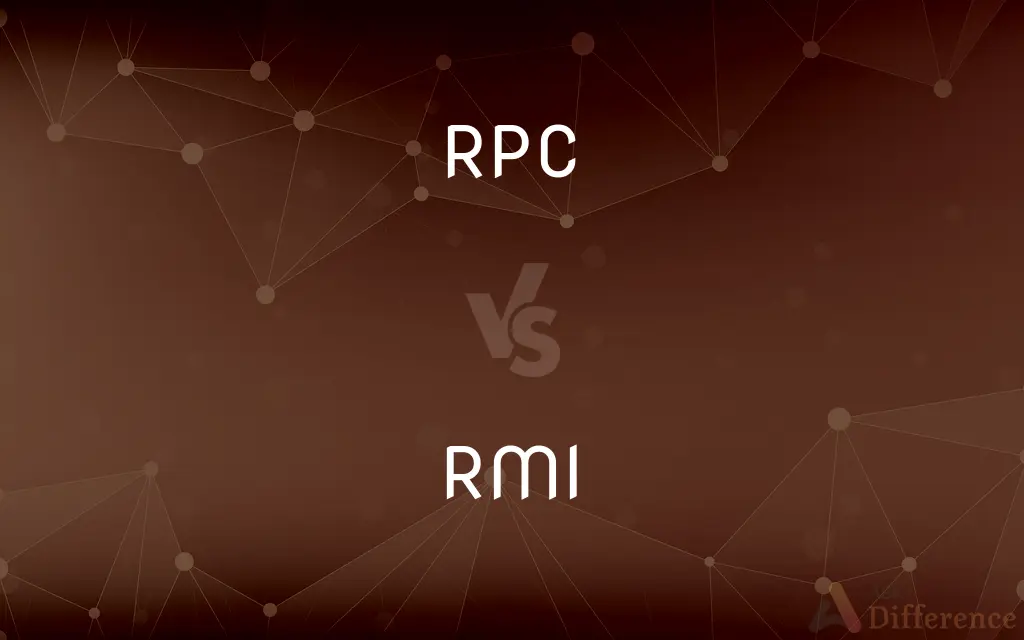RPC vs. RMI — What's the Difference?
By Tayyaba Rehman — Published on January 6, 2024
RPC (Remote Procedure Call) is a protocol for executing procedures on remote systems, while RMI (Remote Method Invocation) is a Java API enabling remote execution of Java object methods.

Difference Between RPC and RMI
Table of Contents
ADVERTISEMENT
Key Differences
RPC (Remote Procedure Call) enables executing functions on remote systems, appearing as local function calls. RMI (Remote Method Invocation) specifically allows invoking methods on remote Java objects.
In RPC, the focus is on calling procedures remotely, irrespective of the programming language. RMI is designed for Java, enabling Java objects to invoke methods of remote Java objects.
RPC abstracts the network communication, enabling developers to make remote calls similarly to local calls. RMI extends this concept in the Java ecosystem, seamlessly integrating remote method calls within Java applications.
RPC is language-independent and can be used with various programming languages. RMI, being part of the Java framework, is exclusive to Java and leverages Java’s object-oriented features.
RPC typically involves a simpler data exchange mechanism, often using standard data serialization methods. RMI can handle complex Java objects, including those with multiple data types and hierarchies.
ADVERTISEMENT
Comparison Chart
Scope
Language-independent procedure calling
Java-specific method invocation
Integration
Generic network communication abstraction
Seamlessly integrated into Java applications
Use Case
Executing remote procedures in various environments
Invoking methods on remote Java objects
Complexity
Simpler data exchange and serialization
Handles complex Java object hierarchies
Applicability
Broadly applicable across different programming languages
Exclusive to the Java programming environment
Compare with Definitions
RPC
Simplifies network programming.
RPC abstracted the details of network communication, making development faster.
RMI
Java API for remote method invocation.
The Java app used RMI to access services on the remote server.
RPC
A protocol to execute code on a remote system.
The client application used an RPC to query the database server.
RMI
Specific to Java object-oriented programming.
RMI facilitated object-oriented remote interactions within the Java ecosystem.
RPC
Language-independent communication.
RPC allowed the Python application to interact with the remote C++ service.
RMI
Enables calling methods of remote Java objects.
RMI was used to invoke the compute method on the distributed object.
RPC
Makes remote functions appear local.
With RPC, the software could remotely call system functions without complex network coding.
RMI
Handles complex Java object communication.
RMI seamlessly handled the transfer of complex Java objects across the network.
RPC
Used in various client-server applications.
The client's request to the server for data retrieval was made through an RPC.
RMI
Integrates remote calls into Java applications.
RMI made it seamless to integrate remote functionalities in the Java system.
Common Curiosities
What does RMI stand for?
RMI stands for Remote Method Invocation, specific to Java.
How does RPC differ from RMI?
RPC is language-independent for remote procedure calls, while RMI is Java-specific for remote method invocation.
What is RPC?
RPC is a protocol for executing remote procedures as if they were local calls.
Is RPC limited to a specific programming language?
No, RPC can be implemented in various programming languages.
Does RPC support complex object types?
RPC generally supports simpler data types and serialization methods.
Can RMI be used outside of Java?
No, RMI is specifically designed for Java applications.
Can RMI handle complex Java objects?
Yes, RMI can manage complex Java objects and their hierarchies.
What makes RPC popular?
Its ability to simplify network communication and function calls across different systems.
Is RMI integrated into the Java framework?
Yes, RMI is seamlessly integrated into Java for remote object-oriented programming.
Are there security considerations with RPC?
Yes, securing RPC calls is crucial to prevent unauthorized access and data breaches.
How does RMI enhance Java programming?
RMI allows Java developers to easily incorporate remote method calls into their applications.
What are typical use cases for RPC?
RPC is commonly used in networked client-server applications for remote function execution.
Can RPC and RMI work together?
They can be used together in a system, but they serve different purposes and are not directly interdependent.
Is RMI used in distributed computing?
Yes, RMI is commonly used in Java-based distributed computing environments.
Are there any limitations to using RMI?
RMI is limited to Java environments and may require careful handling of object serialization and network issues.
Share Your Discovery

Previous Comparison
High-Level Languages vs. Low-Level Languages
Next Comparison
Urea vs. Uric AcidAuthor Spotlight
Written by
Tayyaba RehmanTayyaba Rehman is a distinguished writer, currently serving as a primary contributor to askdifference.com. As a researcher in semantics and etymology, Tayyaba's passion for the complexity of languages and their distinctions has found a perfect home on the platform. Tayyaba delves into the intricacies of language, distinguishing between commonly confused words and phrases, thereby providing clarity for readers worldwide.
















































